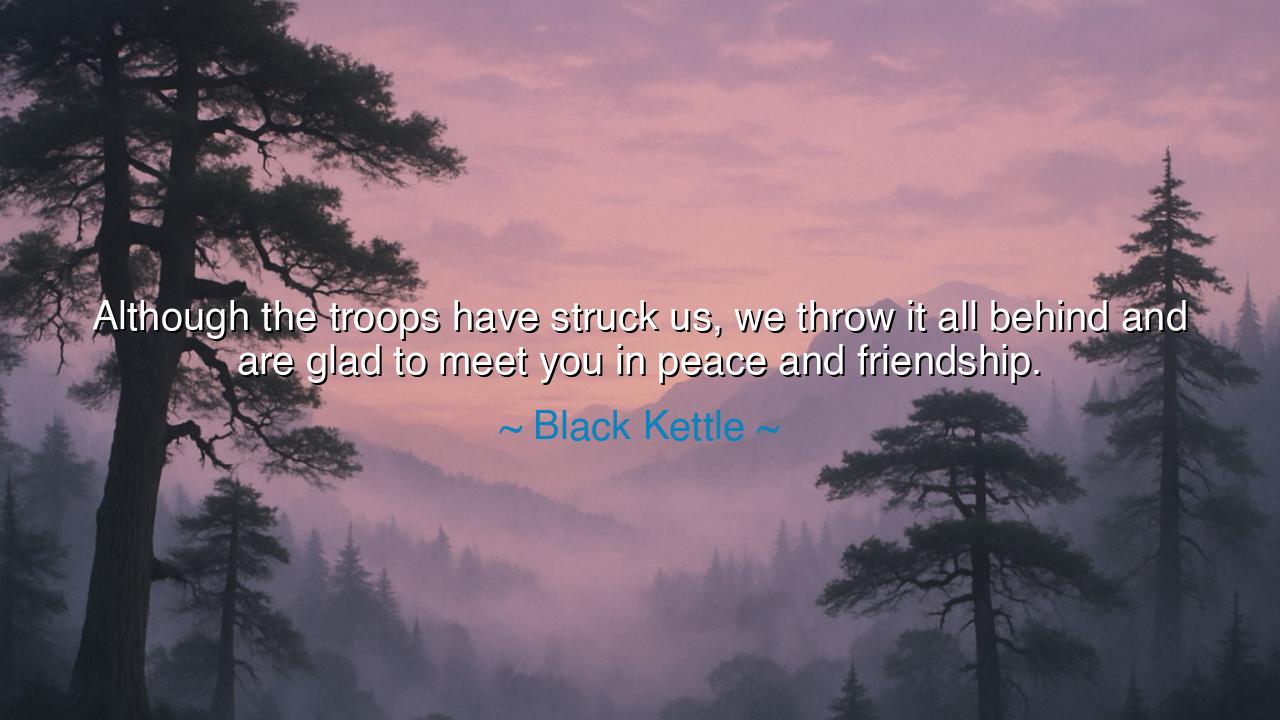
Although the troops have struck us, we throw it all behind and
Although the troops have struck us, we throw it all behind and are glad to meet you in peace and friendship.






Hearken, O seeker of wisdom, to the words of Black Kettle, the revered chief of the Cheyenne: “Although the troops have struck us, we throw it all behind and are glad to meet you in peace and friendship.” Here is a voice that rises above the fury of conflict, a heart unbowed by suffering, and a soul committed to the noblest of human pursuits: the embrace of peace and the offering of friendship even when betrayal and violence have been visited upon the innocent. These words emerge from a time when the vast plains were scarred by the clash of empires and the relentless march of those who would claim dominion by force. Yet, amid the ashes of devastation, Black Kettle’s heart speaks a truth eternal: that true strength lies not in retaliation, but in the courage to extend the hand of reconciliation.
The origin of this declaration lies within the tragic sweep of the American West, in the mid-19th century, when the Cheyenne people faced relentless incursions by the U.S. military. Black Kettle, a leader of wisdom and compassion, endured assaults such as the Sand Creek Massacre of 1864, where men, women, and children were brutally slain. Yet, in the face of such horror, he sought not vengeance alone but the preservation of his people’s dignity through gestures of peace. In this act, he exemplified the principle that the heart’s measure is revealed not in the fury of retribution but in the generosity of forgiveness and the pursuit of lasting harmony.
Consider the depth of this sentiment: to throw it all behind is to release the chains of bitterness, to lay down the burden of hatred that could consume the spirit. It is a heroic act, demanding a courage that surpasses the call of the battlefield. For many, the instinct after suffering is to retaliate, to repay wound with wound, to allow anger to fester into endless conflict. Yet Black Kettle teaches that the path of peace requires the relinquishment of such instincts, a conscious decision to place the welfare of community, of future generations, above the desire for immediate revenge. In this, there is both vulnerability and unparalleled strength.
History offers echoes of such courage beyond the plains. Recall Nelson Mandela, who emerged from decades of imprisonment not with a heart hardened by resentment, but with a vision of reconciliation for a nation torn by racial hatred. Mandela’s choice to forgive and to work toward unity rather than vengeance transformed South Africa and inspired the world. Similarly, Black Kettle’s embrace of friendship after attack illuminates a principle that transcends time: that the noblest leaders, the truest souls, rise not in triumph over enemies but in service to peace.
Yet the teaching is not abstract—it is a guide for action in every life. When we are wronged, when others strike against us with words or deeds, we are called to ask: do we let bitterness bind us, or do we embody the courage to throw it all behind? Black Kettle’s words challenge us to rise above the instinct of retaliation, to meet hostility with the strength of compassion, and to cultivate bonds that heal rather than perpetuate cycles of suffering. It is a lesson both timeless and immediate, for human hearts have always been arenas of conflict and potential reconciliation.
The story of the Cheyenne and Black Kettle also underscores the fragility and preciousness of peace. In the midst of betrayal and bloodshed, peace is not a passive state but an active labor of the soul. To seek friendship with those who have wronged us requires insight, patience, and a recognition of the shared humanity in all. The Plains once echoed with the sounds of war, yet in Black Kettle’s resolve, there is the quiet power of a leader who knew that the enduring legacy of his people would depend not on the sword but on the hand extended in goodwill.
From these reflections, a clear lesson emerges: true strength is measured not by the blows we can deliver, but by the courage we summon to forgive, to reconcile, and to build bridges where walls of hatred once stood. Practical actions follow: release grudges that anchor the spirit, seek dialogue with those who oppose us, and cultivate the discipline to act from peace rather than anger. Like Black Kettle, we may find that the heart unburdened by revenge is capable of fostering relationships that endure beyond the moment of conflict.
Thus, as the ancients might have counselled, let us carry Black Kettle’s wisdom into our own lives: when struck, do not strike back in blind fury. Instead, rise with dignity, extend the hand of friendship, and walk the noble path of peace. In this, the spirit finds freedom, the community finds healing, and the soul discovers a strength greater than any weapon: the enduring power of forgiveness and human connection.






AAdministratorAdministrator
Welcome, honored guests. Please leave a comment, we will respond soon